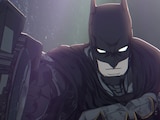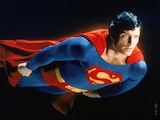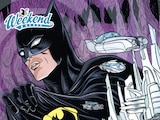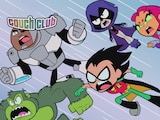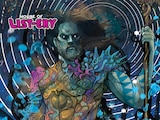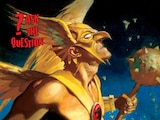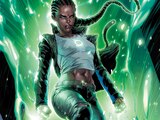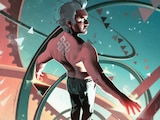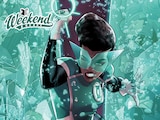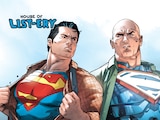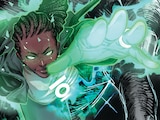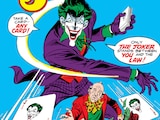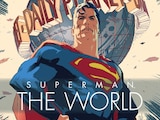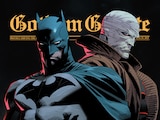How would you describe Black Adam? Regardless of your overall opinion, I think we can all agree that it’s different than any of DC’s other superhero films, right? Black Adam, which debuts today on HBO Max, is a different kind of superhero movie, with a different kind of protagonist, largely because of Teth-Adam’s origin story.
Consider who some of the most well-known superheroes are and think about their origins. You’ll begin to notice some patterns. Superhero origins usually involve a character coming of age. Bruce Wayne spends his childhood preparing to become Batman. Clark Kent learns about heroism while growing up on a rural farm in Smallville. Even the origins of lesser-known heroes like Black Adam’s Kent Nelson typically begin during childhood. The young Nelson met the sorcerer Nabu as a child and doesn’t become Doctor Fate until he reaches adulthood.

With these more traditional origin stories, growing up is an essential step on the path to heroism. Once the protagonist reaches adulthood, they’re ready to become the hero we know today.
Another common story beat is the death of a parent. Batman, Superman and Doctor Fate all experienced the death of their parents as part of their heroic journey and they’re hardly alone in that. Picture yourself at a Justice League, Justice Society or Teen Titans meeting. If you took a roll call of orphans, you’d be surprised at the number of hands in the air.
This is what sets Teth-Adam apart from the other DC Universe heroes. When the story begins, Teth-Adam is already a man, with his childhood multiple decades behind him. He’s already approaching the world with a jaded outlook, having left behind the optimism and drive that comes with youth. Teth-Adam doesn’t experience the loss of a parent. Instead, his origin is kickstarted by the death of his son, Hurut. Witnessing the death of a child as a parent is a far different experience than witnessing the death of a parent as a child. This shapes Teth-Adam, his outlook and the kind of superhero he is.

Initially, the film leads us to believe Hurut is actually Black Adam and that we’re getting a traditional superhero story. This was a great subversion of expectations. As we watch the prologue, it looks like we’re getting a traditional origin story. Hurut is optimistic, despite living as a slave. He has the courage to stand up to Ahk-Ton’s forces and isn’t afraid to die for what he believes in.
That’s why the Wizard Shazam chose Hurut to be his champion. This is the champion that Kahndaq erected statues for. This is the beacon of hope that the country looks to. But he’s not the protagonist of the movie. As we later learn, Hurut gave up his powers to save his father Teth-Adam. Tragically, Ahk-Ton’s soldiers killed him seconds later.
This was the moment that shaped Teth-Adam. Most heroes witness the death of their parents and it sets them on a path of justice. But what happens when you see the death of your child instead? What happens when you witness that death as an adult, having already lost the optimism of childhood? Not only that, but you’re seeing that youthful optimism killed right before your eyes. No wonder Teth-Adam lacks the faith and belief in second chances that more traditional heroes possess.

Most superheroes who lose their parents try to live up to their ideals and honor their memory. Here we have an inversion of that. Black Adam wants to honor Hurut’s heroic legacy, but he doesn’t feel worthy. He feels like Kahndaq would have been better with Hurut as their champion. The Wizard Shazam chose Hurut, not Teth-Adam. While that’s true, Teth-Adam also has to keep in mind that he was chosen—by Hurut.
Hurut gave his father the power because he felt his father was worthy. Teth-Adam may not believe in himself, but Hurut believed in him. Hurut may have just been a child trying to save his dad, but I think history has proven that he made the correct choice. While Teth-Adam’s style might be more violent than the more traditional heroes of the Justice Society may be comfortable with, he is using his power to help his people. While the comic book version of Black Adam may be a villainous dictator, his cinematic counterpart never sets out to harm innocent people. That’s because Dwayne Johnson’s version of the character has something the comics version didn’t: the influence of Hurut’s sacrifice.
Why does Black Adam feel different from so many superhero movies? The answer is Hurut. Like Thomas Wayne or Jor-El, his death resulted in the birth of a hero. Even if it took the hero a little bit longer than usual to realize it.
Black Adam, directed by Jaume Collet-Serra and starring Dwayne Johnson as Black Adam, is now streaming on HBO Max.
Joshua Lapin-Bertone writes about TV, movies and comics for DC.com, is a regular contributor to the Couch Club and writes our monthly Batman column, "Gotham Gazette." Follow him on Twitter at @TBUJosh.
NOTE: The views and opinions expressed in this feature are solely those of Joshua Lapin-Bertone and do not necessarily reflect those of DC Entertainment or Warner Bros.

